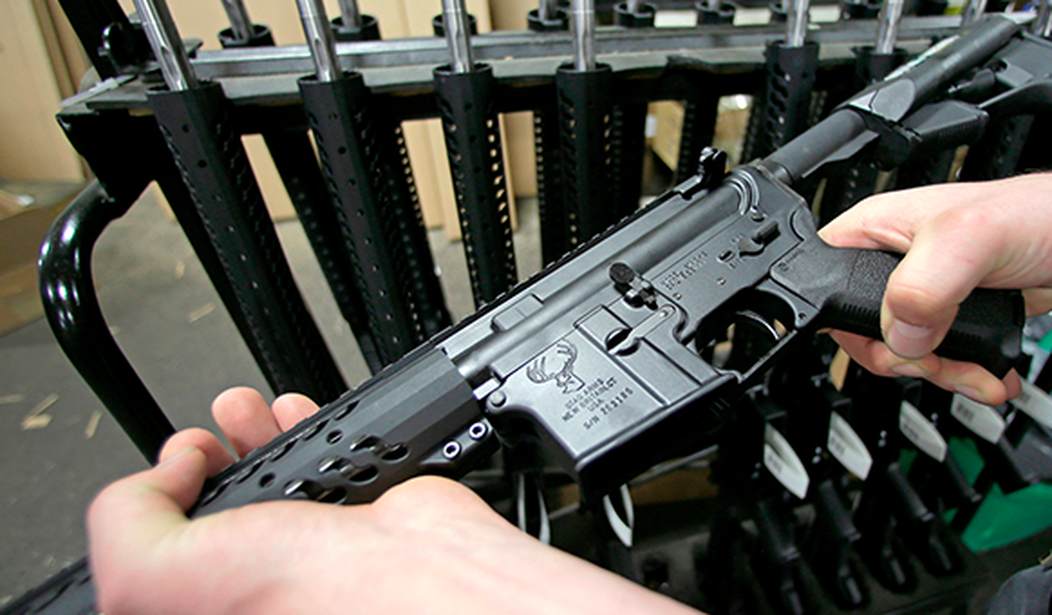It’s easy for politicians to make grand statements and give ambitious ideas, particularly during campaigns, but they rarely ponder the actual implications of how in the hell to make their proposals become a reality.
Sometimes it works. Perhaps the best example was JFK’s declaration that we would walk on the moon.
Most of the time, though, it doesn’t. Mostly because the statements sound good to a politicians base of supporters but rarely have any relationship to reality.
Take, for example, Beto O’Rourke’s call for taking AR-15s and AK-47s off the streets forever. The Associated Press decided to explore how difficult it would be to take the guns.
Democratic presidential candidate Beto O’Rourke’s recent vow to take away people’s AR-15 and AK-47 rifles raised one big question: How is it possible to round up the millions of such guns that exist in the United States?
The number of AR-15 and AK-47s in the U.S. is estimated at a staggering 16 million, creating logistical challenges to take them out of circulation. Many gun owners are also unwilling to turn over the weapons, and if the government offered to buy them all back at face value, the price tag could easily run into the billions of dollars.
And that’s if people are willing to sell them to the government regardless of price. Many gun owners have vowed not to sell them at any price, so the upside is that a mandatory buyback wouldn’t cost the government close to that much, but only because so few would willingly do any such thing.
O’Rourke’s pointed declaration during a recent debate — “Hell yes, we’re gonna take your AR-15, your AK-47” — stoked longstanding fears among gun owners that Democrats are less interested in safety or finding a middle ground, and just want to confiscate guns. Even some gun-control advocates aren’t so sure that confiscating firearms will work.
“In some regards, this horse is out of the barn,” said David Chipman, a retired agent with the federal Bureau of Alcohol, Tobacco, Firearms and Explosives and now the senior policy adviser for the Giffords group. “For years we’ve allowed these to be sold.”
Chipman is a favorite for journalists to talk to because his ATF background makes him appear to be something other than a gun-grabber. He’s not, though. He’s a gun control activist with a law-enforcement background and nothing more.
Even Chipman admits that you’re never going to get all these guns off the streets. He’s realistic enough to know that no matter what you try, some of us will be holding onto our rifles, thank you very much.
O’Rourke believes that most people would follow the law and turn their weapons in under his proposal for a mandatory buyback program and assault weapons ban. He also wants to outlaw high-capacity magazines and expand background checks.
O’Rourke would do well to believe in unicorns and the Easter Bunny.
Most AR-15 owners wouldn’t do any such thing. Some might sell one back as a way of trying to make the government think they’d complied, but they would boast five more at home. Those guns aren’t going anywhere.
Democratic candidates pushing gun buybacks have also pointed to similar moves in Australia and New Zealand. However, the number of AR-style long guns in those countries pales in comparison to the United States, and neither has gun rights enshrined in their constitutions.
Chipman believes an assault weapon ban should be handled similar to the machine gun rules, requiring they be registered and heavily regulated but not confiscated.
“I think it would be far more likely that we would find more of the weapons under comprehensive regulation by the government than sort of a forced buyback ban scenario,” he said.
To be fair to Chipman, that would be far more practical, but it’s still not going to happen.
The difference is that so-called “assault weapons” are defined based on cosmetic features, rather than any inherent mechanisms within the gun. Machineguns are defined in a clear manner. If you can pull the trigger once and the weapon will fire more than once, it’s a machinegun. That makes it easy to determine which guns qualify and which don’t. It’s a mechanical difference in the weapon.
The guns we’re talking about here are functionally no different than other rifles that wouldn’t be impacted by such a law.
So no, it’s not going to happen.
In the end, while the AP doesn’t expressly say so, it seems they’ve realized that Beto’s plan isn’t going to happen.
Of the estimated 16 million AR-style guns that are in circulation, about half of them are owned by current or former members of the military or law enforcement, according to the National Shooting Sports Foundation.
Then, there are the logistics of actually getting millions of firearms handed over. Some law enforcement experts question whether a mass confiscation of firearms could be done effectively or safely.
Even some self-identified liberals who own firearms question the legality of gun confiscation and even the practicality.
“Constitutional rights aren’t based on what you like. What’s the slippery slope of this?” said Lara C. Smith, the national spokeswoman for the Liberal Gun Club, a nonprofit group of liberal gun owners. “If they’re going to take away these rights, what other rights are they going to take away?”
Precisely.
The truth of the matter is that gun confiscation of any kind is the predetermined “line in the sand” for many gun owners. Once that begins, all bets are off and many are ready to go to war. That alone should give everyone pause before they start this kind of nonsense.







Join the conversation as a VIP Member